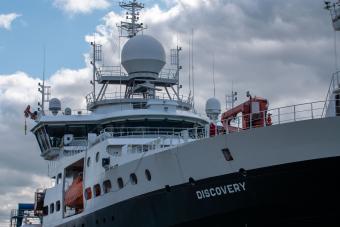On Sunday 13 October the RRS Discovery sailed from Southampton to Punta Arenas, in Chile, as part of the annual Atlantic Meridional Transect (AMT) research expedition.
National Oceanography Centre (NOC) technicians are on board using sediment traps to capture particles of sinking material within a large system of circulating water in the Atlantic. These systems, or gyres, occupy 40% of the Earth’s surface and are characterised by a relatively low level of marine life. So much so, they are often referred to as ‘ocean deserts’.
The sheer size of these gyres means that carbon cycling within them plays a significant role in the global carbon cycle. These gyres are likely to be growing larger as the climate changes, therefore this research expedition presents an excellent opportunity to record and monitor the movement of carbon in this region.
AMT is funded through NERC National Capability and hosted by the Plymouth Marine Laboratory in collaboration with the NOC. The AMT programme informs on changes in biodiversity and function of the Atlantic ecosystem during this period of rapid change to our climate and biosphere.
This work is part of the CLASS programme (Climate Linked Atlantic Sector Science) which aims to increase our understanding of how the ocean will evolve under a changing climate and increased human exploitation, with the objective to support sustainable marine management.

